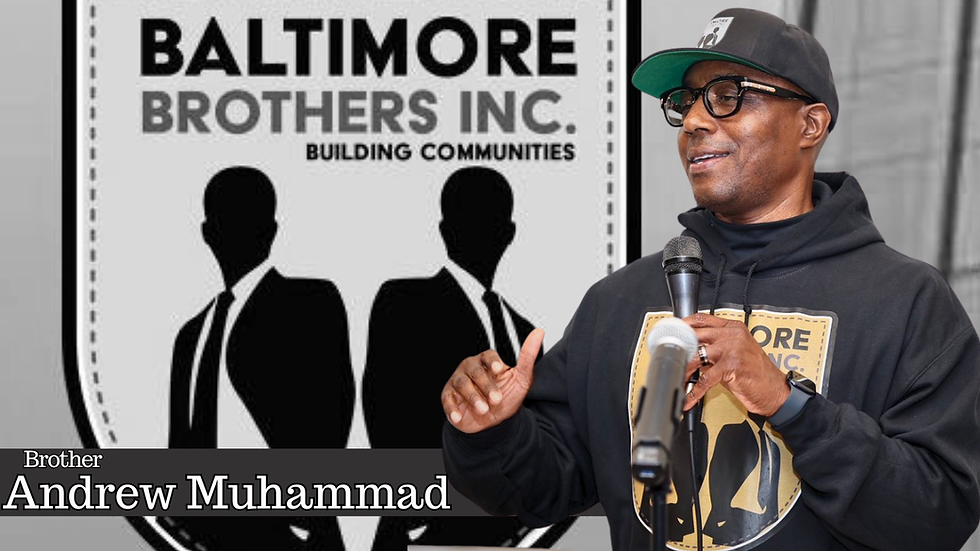"From the Cell to the Pen: Edward Ford’s Story of Faith and Authorship"
- Brother Levon X

- Apr 17
- 3 min read

When we met Brother Edward, it was clear—this brother was different. His insight, intellect, and perspective stood out in a powerful way. We believe we should always learn from one another, and Brother Edward’s journey is one we can all grow from.
He didn’t find Islam through tradition—he found it through transformation. Behind prison walls, he wasn’t searching for religion; he was searching for truth. And what he found gave him direction, purpose, and the strength to rise.
In a world that often writes Black men off, the Nation of Islam offers something rare: discipline, identity, and a clear path forward. Brother Edward’s life is proof of that.
Now, he’s sharing his journey in a way that uplifts others—and we’re honored to introduce him.
"I’m Beginning To Understand My Upbringing".
By Guest Writer Brother Edward Ford
In the Name of Allah, The Beneficent, The Merciful As-Salaam Alaikum,
I found Islam in the unlikeliest of places: a federal prison. Between concrete walls, I opened the Qur’an—not for faith, but for facts. As a student of the Honorable Elijah Muhammad’s teachings, I wanted to know. I approached it the way a skeptic approaches a philosophy book—with questions, doubts, and a hunger for meaning.
Only now am I beginning to understand my upbringing. Growing up in the D.C. ghetto, back when it was known as the “Murder Capital,” shaped the way I saw the world. I looked up to killers. If you weren’t one—or even if you were but weren’t one of us—you were lion food.
That kind of ignorance led me straight to the penitentiary, with a lengthy sentence.
But Islam opened a new world for me. A new way of thinking. My orientation changed. I began looking up to smart people and righteous people—whether they were lost or not. Adopting this new mindset pushed me to strive, to grow, and to excel.
Now, 32 years after accepting Islam, I’ve come to understand much more about myself—my trauma, my personal relationship with Allah, my yearning for acceptance, and the mental tension of being a sycophant in a world that rewards conformity.
I admit, I can be aggressive in my mind, condescending in my thoughts when I recognize con, game, or BS. That part of me? I’m praying that Allah will soften it, regulate it.
There are so many in our community still stuck in ignorance—or whatever the professional term is in the Black Consciousness Movement—and I pray, pray, pray.
Most of all, I pray to overcome my own internal battles. I never had dreams or aspirations. I just didn’t want to get killed. And then, after going to prison so young, all I wanted was freedom.
But as a Muslim, I’ve learned to accept my role in Allah’s creation. I don’t necessarily feel entitled, but… I WANT IT ALL. Falah (Success) belongs to me. It was the pain, the hardship, and the questions that brought me closer to Allah. My mental elevation came as a direct result of seeking Him.
When I started studying Arabic, I had to submit to the learning process. That’s how you maximize growth. You can't approach knowledge like a teacher—you have to approach it like a student, ready to receive. Otherwise, you disrupt the experience.
Learning doesn’t care what you already know, how you already think, or what you feel. It’s about writing on a clean, empty page in your mind. Once you’ve absorbed the subject, then you can filter, integrate, and analyze.
You cannot be a student if you think you already know.
The Honorable Minister Louis Farrakhan taught me to believe in, respect, and obey the Qur’an. So I studied it. But what I found wasn’t blind belief—it was structure, rhetoric, balance, and logic. The Qur’an isn’t just scripture—it’s a literary and philosophical marvel. Its use of ring composition, its linguistic symmetry, and its direct confrontations with injustice all spoke to the reasoning mind, not just the spiritual heart.
That’s why I wrote this book—for the thinkers. For the seekers. For those who don’t need to be converted—just invited into the conversation.

What You’ll Discover in the Book:
How the Qur’an uses language like a precision instrument
The historical and political context of its revelations
A breakdown of Meccan vs. Medinan Suwar
Literary structures that mirror both Greek and Semitic thought
And most importantly: logic, not dogma
Why This Matters Now:
In a time when religion is often used as a wedge, I believe the Qur’an can be a bridge—but only if we present it with intellectual honesty. The logic of the Qur’an is not a religious pitch—it’s a conversation starter. If you’re curious—not just about Islam, but about how the mind and spirit intersect—this book is for you.
Thank you for walking with me.
As-Salaam Alaikum,
Edward Ford





Comments